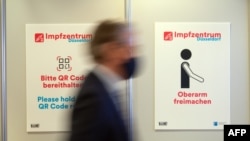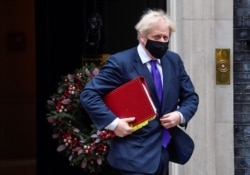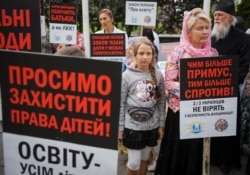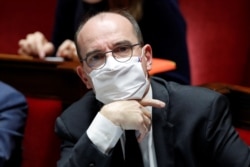Britain’s prime minister, Boris Johnson, has likened the scientists who have developed coronavirus vaccines to the cavalry arriving just in the nick of time. “The toot of the bugle is louder,” he reassured Britons during a recent news conference.
But like his European counterparts, Johnson’s government is scrambling to come up with a vaccine distribution plan and is having to answer key logistical and epidemiological questions, including who should be in the early waves to receive inoculations and how to ramp up a mass immunization program able to vaccinate millions as soon as possible.
On Tuesday, British regulators approved the use of Pfizer's coronavirus vaccine, saying a rollout will begin next week. Health minister Matt Hancock said the approval of the vaccine is “fantastic news.”
And at a Wednesday press conference, Johnson admitted that it would be an “immense logistical challenge” just to get the vulnerable inoculated.
“It will inevitably take some months before all the most vulnerable are protected — long, cold months. So it's all the more vital that as we celebrate this scientific achievement we are not carried away with over-optimism or fall into the naive belief that the struggle is over,” he said.
Most countries say they will focus early inoculations on medical professionals and care workers and vulnerable groups, the elderly and those with chronic underlying health conditions.
Thereafter it gets more complicated.
Vaccine skepticism
And another crucial question is how to persuade enough people to accept vaccinations so that the virus can be suppressed.
Even before the emergence of the coronavirus, Europeans were among the most skeptical about the safety and efficacy of vaccines, according to a pre-pandemic survey of 140,000 people across more than 140 countries.
The survey conducted for the Wellcome Trust, a medical research charity based in London, found that in France, Austria, Switzerland, Russia and Belgium up to a third of the population distrusts vaccines.
And in Ukraine only about half of the population agreed that modern vaccines are safe.
European governments fear vaccine skepticism is only increasing because of social media agitation by extreme critics of vaccinations, or anti-vaxxers. Recent surveys have found that Britons are becoming increasingly questioning about the coronavirus vaccine. A majority in France, Germany, Italy and Britain say they are “likely” to get inoculated, but only a minority say they will definitely get vaccinated. And hesitancy is growing, according to a survey by Kantar, an international data and market research company.
“The findings are potentially alarming for governments around the world. When less than half the population of a nation say they will ‘definitely’ take a vaccine, this implies that governments will have a huge task ahead of them in building up trust in any approved vaccine, and in mobilizing their nations to actually become inoculated,” reads a Kantar press release.
The vaccine skepticism comes amid concerns about the safety of the vaccines, with some questioning the unprecedented haste of the development and testing phases as well as the motives of those behind the vaccines. It also comes amid rising mistrust in some European countries over the handling of the pandemic by governments at a time health care, as well as vaccines, has become entangled in partisan politics.
Online disinformation
And disinformation promulgated online by anti-vaxxers, sometimes amplified by hostile states, isn’t helping, say public health experts, who worry that governments may have difficulty reaching the 55 percent inoculation threshold that’s calculated by some epidemiologists as the minimum to create herd immunity to the virus.
Other scientists say 82 percent of a population needs to be immunized to manage the contagion.
Pollsters have found a link between vaccine refusal and social media use, with people who get their information mainly from Twitter, Facebook, Instagram and similar platforms more likely to be skeptical about vaccines.
The Center for Countering Digital Hate, a London-based nonprofit research group, warned in a report earlier this year that an extensive “anti-vaxx ecosystem,” consisting of “alternative health hucksters and professional conspiracists,” is managing to turn vaccine skeptics into die-hard anti-vaxxers. And it criticized social media giants for profiting directly from anti-vaxx content to the tune of an estimated $1 billion a year and not doing enough to ensure disinformation is scrubbed from their platforms.
British officials are so alarmed by vaccine skepticism that they have directed an elite military “information warfare” unit, more used to disrupting al-Qaida and Islamic State propaganda operations, to assist in countering anti-vaxx disinformation. The British army’s 77th Brigade, a unit that works side-by-side with psychological operation teams, has been detailed to help a Downing Street group monitor cyberspace for COVID-19 content and to disrupt vaccine disinformation given out on social media sites by hostile states, including Russia, according to The Times newspaper.
Their efforts will go hand in hand with a huge public information campaign aimed at encouraging people to get inoculated.
But some public health experts and political psychologists worry that making more scientific information available about the safety of the vaccines may not be enough to persuade doubters to be less skeptical. They argue governments need to focus on getting trusted sources, such as medical professionals and community leaders, to convey a clear message about the importance of getting vaccinated rather than the message coming just from top officials and ministries. That way, they say, a more persuasive social consensus can be built from the ground up.
In France, where vaccine skepticism rocketed when a controversial program in 2009 was rolled out to vaccinate people against an especially menacing strain of influenza, officials have expressed alarm about the possible take-up of vaccines. Last week, President Emmanuel Macron said vaccinations would likely start later this month, but his prime minister, Jean Castex, has said he’s worried not enough people will agree to be vaccinated.
The chairman of the French Senate, Gérard Larcher, has called for mandatory inoculations, saying, “It’s not just for yourself, it’s a form of solidarity and protection for the whole of society.” But so far Macron has rebuffed the idea of compulsion, fearing it will prompt greater resistance. Fifty-nine percent of the French say they will refuse to be vaccinated, according to an opinion poll conducted for Journal du Dimanche.
Germany’s science minister, Anja Karliczek, said Tuesday vaccinations would be voluntary and that the same safety standards are being applied in the approval process for coronavirus vaccines as for other drugs. Emphasizing how standards have been maintained would likely gain the widest possible public acceptance for coronavirus immunization, she added.
Logistical challenges
Aside from the problem posed by vaccine refusal, European governments say they’re also trying to solve logistical challenges, from securing sufficient vaccines before the northern hemisphere summer ends, to having enough cold storage facilities for the vaccines manufactured by Pfizer and Moderna, when they start arriving after European regulators have approved them.
The vaccine developed by U.S. pharmaceutical giant Pfizer needs to be stored and shipped at minus 75 degrees Celsius. Germany has already started gearing up to solve the storage challenge, with large freezers already rolling off production lines. Wales’ health minister, Vaughan Gething, warned Tuesday that the Welsh government doesn’t have any storage facilities as yet and will be unable to receive or store any vaccines allocated by the British government.
Other challenges include having sufficient staff available to administer vaccines, setting up data systems able to track the progress of immunizations and notifying people when to receive vaccinations and then when to return for a second booster shot. Germany is planning to set up inoculation centers that will be overseen by the governments of the country’s 16 regional states.
In France, immunizations will likely be left to family doctors and local pharmacists. In Britain, the national health service will be in charge, but it has been overstretched with rolling out tests and tracing the contacts of the infected, earning sharp criticism from lawmakers.
Government officials across Europe say they hope that they have learned lessons from the less than smooth supply lines and production shortages they experienced earlier in the year for ventilators, drugs and personal protective gear. Huge global demand led to bottlenecks, delays and transportation shortfalls.








